by Andrew Rigby
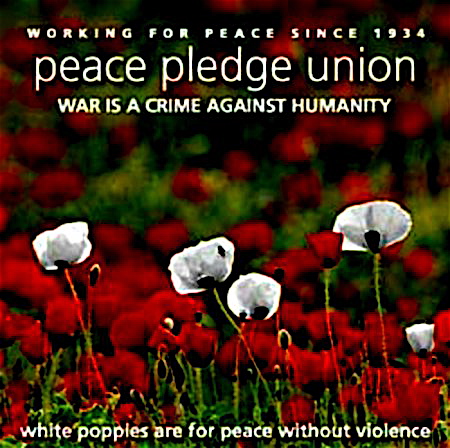
Peace Pledge Union poster courtesy hastingsonlinetimes.co.uk
“If we got, say, a million voters actively insisting that they’ll never take part in any war,
the Government would have to begin to take notice.” Dick Sheppard. (1)
Such was the optimistic hope and political strategy of Dick Sheppard, the founder and moving spirit of the Peace Pledge Union (PPU), writing in 1936. His faith in the possibility of creating a pacifist movement of such a scale that no government could afford to ignore its influence was not totally unfounded at that time. The PPU had a membership of over 118,000, with some 300 local groups in existence, and a weekly newspaper (Peace News) with sales of approximately 6,000. The origins of the PPU date back to October 1934, when Sheppard published his Peace Letter requesting people to contact him who shared his pacifist determination to renounce war and never support or sanction another one. The burgeoning growth of the PPU in those pre-war days, as the New Statesman observed, lay in its appeal “not only to the convinced absolutist pacifist but to the large number of people with only slight political knowledge but with a recent realization of the fearful imminence of war, who are fascinated by the direct simplicity of the crusade.” (2)
Read the rest of this article »
by William J. Jackson
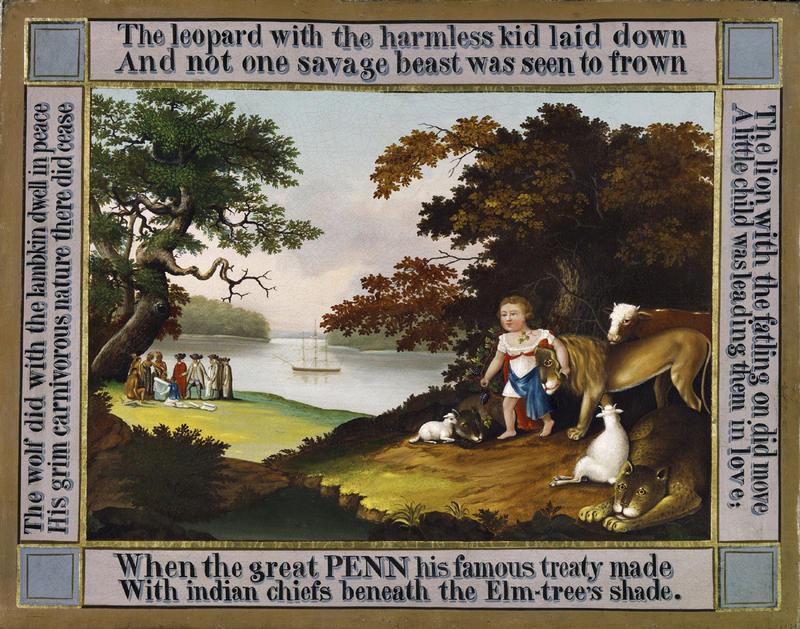
Edward Hicks, “The Peaceable Kingdom: The Leopard and the Kid”, courtesy wikimedia.org
When the 9/11 terrorist attack happened, I recalled an observation which Martin Luther King, Jr. had made when visiting singer-actor-activist Harry Belafonte in 1968: “I’ve come upon something that disturbs me deeply,” he said. “We have fought hard and long for integration, as I believe we should have, and I know that we will win. But I’ve come to believe we’re integrating into a burning house.” (italics added)
When Belafonte asked Dr. King to explain further, he said “I’m afraid that America may be losing what moral vision she may have had. And I’m afraid that even as we integrate, we are walking into a place that does not understand that this nation needs to be deeply concerned with the plight of the poor and disenfranchised. Until we commit ourselves to ensuring that the underclass is given justice and opportunity, we will continue to perpetuate the anger and violence that tears at the soul of this nation.”
Read the rest of this article »
by M. K. Gandhi
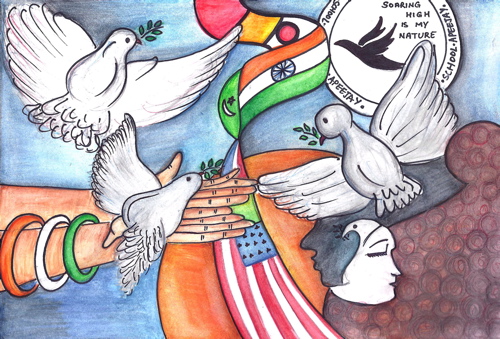
Peace Quilt designed by 9th grader Vidhi Jain, Apeejay School, Pitampura, India; courtesy peacequilt.wordpress.com
Editor’s Preface: We have posted a series of statements by Gandhi that very much address situations and conflicts we currently face, as with his statements on Truth. The “nuclear menace” is much in the news again. These extracts are then being posted in August, the anniversary month of the bombings of Hiroshima and Nagasaki. Please consult the notes at the end for notes, and sources. JG
Has not the atom bomb proved the futility of all violence? (1)
There have been cataclysmic changes in the world. Do I still adhere to my faith in truth and non-violence? Has not the atom bomb exploded that faith? Not only has it not done so, but it has clearly demonstrated to me that truth and non-violence constitute the mightiest force in the world. Before it the atom bomb is of no effect. The two opposing forces are wholly different in kind, the one moral and spiritual, the other physical and material. The one is infinitely superior to the other which by its very nature has an end.
Read the rest of this article »
by David M. Craig
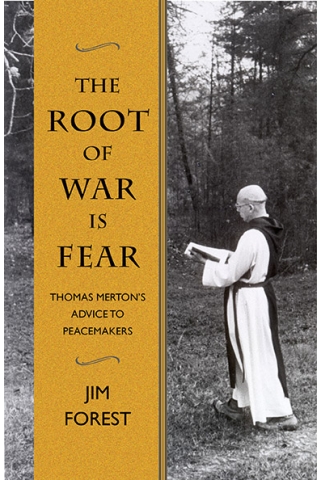
Dustwrapper art courtesy Orbis Books; orbisbooks.com
Jim Forest has written a deeply personal book, The Root of War Is Fear: Thomas Merton’s Advice to Peacemakers (Maryknoll, NY: Orbis Books, 2016). It is personal in two ways. First, the book is a memoir of Forest’s encounters with Merton during the 1960s. A co-founder of the Catholic Peace Fellowship and former managing editor of The Catholic Worker, Forest stumbled upon Merton’s spiritual autobiography The Seven Storey Mountain in late 1959 when he was still in the United States Navy. Up until Merton’s untimely death in 1968, Forest corresponded with Merton and visited him at his Trappist monastery in Kentucky. The book’s chapters proceed chronologically, weaving substantial excerpts from Merton’s writings on peace and war into an assessment of his intellectual, moral, and spiritual significance for the Catholic Church, peace activists, and Forest himself.
Second, the book locates the beating heart of Merton’s transformative influence in a Christian personalism. This theology affirms that every person is God’s child, while revealing each person as woefully self-justifying yet still redeemed in Jesus Christ. Merton’s theology manifests in vivid flashes of writing, not abstract doctrinal statements like this one. For example, Merton decided to intervene more publicly in contemporary debates following his 1958 epiphany on a Louisville street corner. Merton recounts how the “illusory difference” of human separateness vanished in a rush of unbounded joy that “God Himself gloried in becoming a member of the human race.” He continues, “There is no way of telling people that they are all walking around shining like the sun… There are no strangers… If only we could see each other [as we really are] all the time. There would be no more war, no more hatred, no more cruelty, no more greed… I suppose the big problem is that we would fall down and worship each other.” (17-18, ellipses and brackets are Forest’s.)
Read the rest of this article »
by War Resisters League
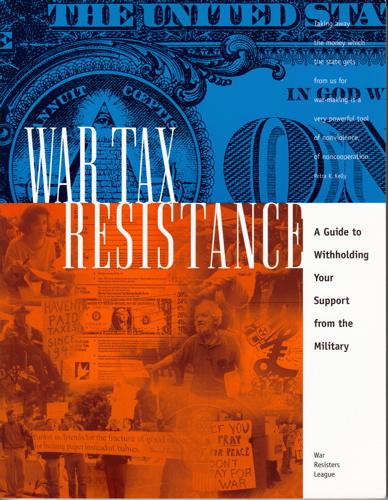
Dustwrapper art courtesy www.warresisters.org
Refusing to pay taxes for war is probably as old as the first taxes levied for warfare. We offer below a summary of such protest, which is to say it does not include other forms of tax refusal and resistance, a common tactic in worldwide labor movements, for example, or in various anti-colonial protests including such well-known examples as the Boston Tea Party.
Indeed, until World War II, war tax resistance in the U.S. manifested itself primarily among members of the historic peace churches — Quakers, Mennonites, and Brethren — and usually only during times of war. There have been instances of people refusing to pay taxes for war in virtually every American war, but it was not until World War II and the establishment of a permanent, centralized U.S. military (symbolized by the building of the Pentagon) that the modern war tax resistance movement was born.
Colonial America
One of the earliest known instances of war tax refusal took place in 1637 when the relatively peaceable Algonquin Indians opposed taxation by the Dutch to help improve their local Fort Amsterdam. Shortly after the Quakers arrived in America (1656) there were a number of individual instances of war tax resistance. For example, in 1709 the Quaker Assembly refused a request of £4000 for a military expedition into Canada, replying, “It is contrary to our religious principles to hire men to kill one another.”
Read the rest of this article »
by Lawrence Rosenwald
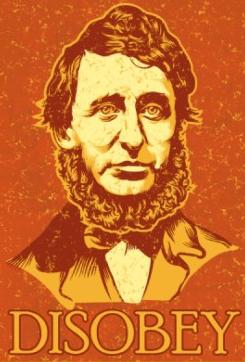
Poster art of Thoreau courtesy pinterest.com
Doing tax resistance has for me been connected with thinking about Thoreau, whose works I often teach in my classes. I used not to teach “Civil Disobedience,” but only Walden; although I admired “Civil Disobedience” very much, but couldn’t bring myself to teach it. It is an essay intended as an argument; I knew that if I taught it I would present it as an argument, as an argument I found reasonable and compelling, and then, I thought, some alert and nervy student would ask, “If you think it’s such a good argument then why are you paying your taxes?” And then I’d either mutter something about how times have changed, or say I was a coward, and I knew I wouldn’t like myself in either case. But when my wife and I began doing tax resistance, I began to teach “Civil Disobedience,” and in fact teaching it — not proselytizing with it, but teaching it on a footing of equality — is among the rewards doing tax resistance has brought me.
So I want to talk about Thoreau, first, and about the ideas his tax resistance came from; and then about myself, as someone who finds Thoreau’s stance attractive but who knows that, after all, times have changed, and that doing tax resistance now is different from doing it then, and grimmer; and generally about why so many people with political views similar to mine don’t find Thoreau attractive or at any rate don’t do tax resistance, and how this can perhaps be changed.
Read the rest of this article »
by National War Tax Resistance Coordinating Committee
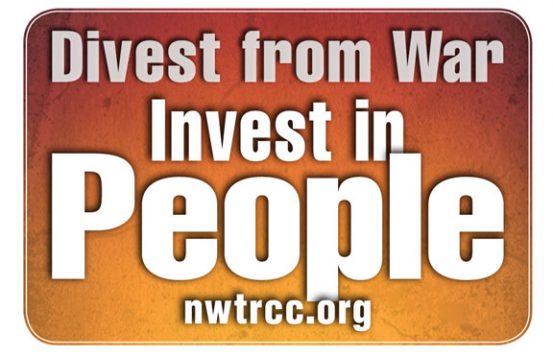
Poster art courtesy nwtrcc.org
Editor’s Preface: This article continues our series of statements of purpose by various nonviolence organizations. The National War Tax Resistance Coordinating Committee (NWTRCC) is a coalition of U.S. local, regional, and national groups and individuals supporting, as they state, “individuals who refuse to pay for war, and promoting U. S. war tax resistance in the context of a broad range of nonviolent strategies for social change.” Their website is a primary source of information on war tax resistance, including tactics and legal consequences. Please see the note at the end for acknowledgments, further information, and links. JG
What is War Tax Resistance?
War tax resistance means refusing to pay some or all of the federal taxes that pay for war. While you can refuse income tax legally by lowering your taxable income, for many people war tax resistance involves civil disobedience. In the U.S. war tax resisters refuse to pay some or all of their federal income tax and/or other taxes, such as the federal excise tax on local telephone service. Income taxes and excise taxes are destined for the government’s general fund and about half of that money goes for military spending, including weapons of war and weapons of mass destruction. Through the redirection of our tax dollars, war tax resisters contribute directly to the struggle for peace and justice.
Read the rest of this article »
by Pope Francis
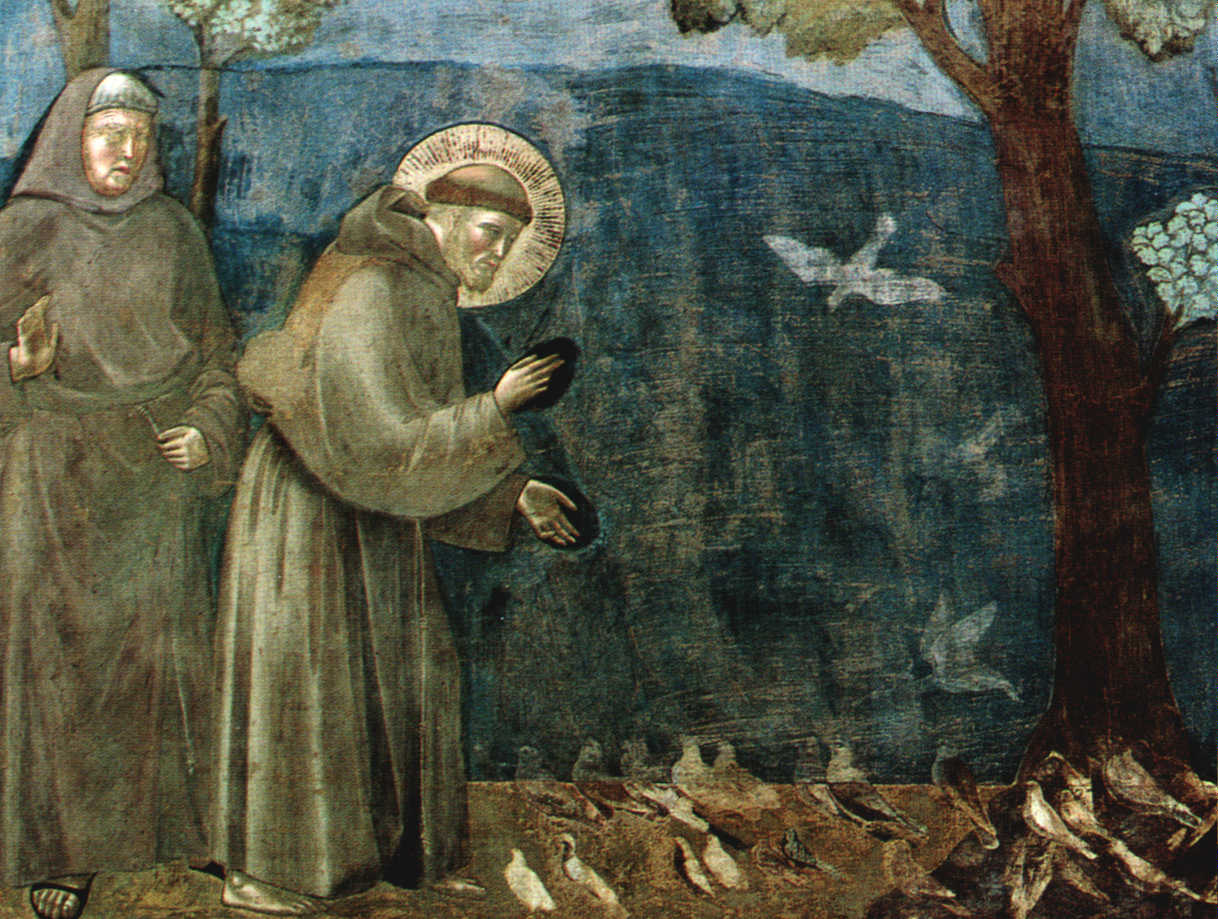
Giotto, “St. Francis Preaching to the Birds”; courtesy jssincivita.com.
Editor’s Preface: The following is the official Papal message for the 50th World Day of Peace, 1 January 2017. It is, however, the first such ever devoted exclusively to nonviolence, in the tradition of Gandhi and Martin Luther King Jr. JG
1. At the beginning of this New Year, I offer heartfelt wishes of peace to the world’s peoples and nations, to heads of state and government, and to religious, civic and community leaders. I wish peace to every man, woman and child, and I pray that the image and likeness of God in each person will enable us to acknowledge one another as sacred gifts endowed with immense dignity. Especially in situations of conflict, let us respect this, our “deepest dignity”, (1) and make active nonviolence our way of life.
Read the rest of this article »
by Joseph Geraci
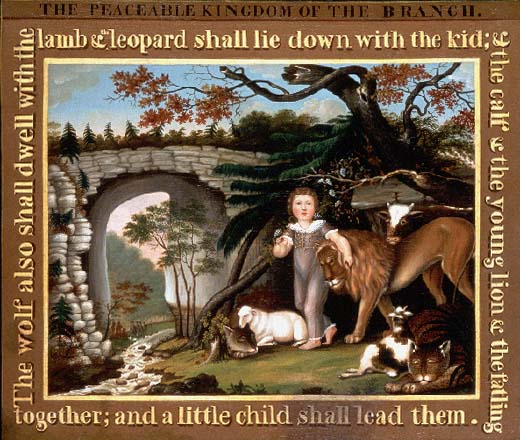
Edward Hicks painting, c. 1823, from the Peaceable Kingdom series; courtesy Abby Aldrich Rockefeller Folk Art Museum.
Peace has been for centuries a universal greeting and sign. We may recall that the World War II military victory V-sign was transformed in the 1960s into a peace symbol; signs of the times. Peace was always more than a simple hello; it was a bestowal of peace on someone, a blessing. In the Middle East, for example, that area of the world so riven by violence, it is perhaps not so strange an irony that a common greeting is (in Hebrew) shalom aleikhem (Peace be with you), and the reply aleikhem shalom (Peace also be with you). In Arabic it is as-sal alaykum (Peace be with you), common to Muslims in Turkey, Indonesia, Central Asia, Iran, India, et al. The response is as-salamu alaykum, and can also be translated as “Peace also be with you”.
Read the rest of this article »
by Terry Messman

Album cover art courtesy allmusic.com
“We’re still struggling as a species with how we can stop war. The families (of Vietnam veterans) were so grateful that anybody would acknowledge their sacrifice. And I don’t mean sacrifice in a clichéd way. The war had reached out and struck their family in a horrible, terrible way.” Country Joe McDonald
Street Spirit: You have been deeply involved in supporting military veterans, but there’s a saying that no good deed goes unpunished. Did Bill O’Reilly of Fox News actually compare you to Fidel Castro because you organized a Veteran’s Day event in 2005 that involved the Gold Star Families for Peace?
Country Joe McDonald: Yeah, he did that! He did say that! He said on his show that me doing a Veteran’s Day event in Berkeley was like having Fidel Castro in charge of it, after we got publicity because we wanted to have a Gold Star father speak in one of our Veteran’s Day events.
Read the rest of this article »














